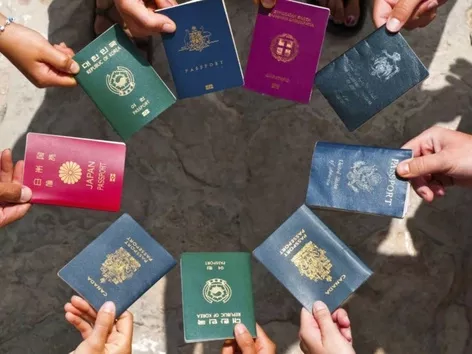Types of visas to Spain: types, requirements and procedure

An important step in every move or trip is to successfully obtain a visa or residence permit. Find out more about the types of visas in Spain, the rules for applying and what documents are required
For any traveler, visas are one area that is often perceived as difficult or confusing, as each country has its own rules and requirements for submitting documents that differ depending on your nationality, length of stay, and planned activities in the future country.
Spain offers several types of visas to travelers. Read more about the available types of Spanish visas, requirements for their issuance and the procedure for obtaining them in our article.
Types of Spanish visas
Depending on the duration of a foreigner's stay in Spain, visas are divided into two types:
● Short-term (Schengen) visas - a visa that entitles a foreigner to enter Spain and stay in the country for a maximum of 90 days within a 180-day period.
● Long-term visas to Spain - they are issued for a stay in the country for more than three months. On the basis of these visas, foreigners have the right to work and study in the country.
At the same time, depending on the purpose of the trip, Schengen (short-term) visas to Spain can be divided into the following types:
● Spanish transit visa - on the basis of this permit, a foreigner has the right to transit through Spain to reach a destination country that is not a member of the Schengen Agreement.
● A tourist or visitor visa to Spain is required for foreigners who plan to travel to Spain to see the country's sights, spend a vacation, or visit friends or relatives living in Spain.
● Business visa to Spain - for foreigners who need to enter Spain to participate in business events.
● Medical visa - for applicants traveling to Spain for medical treatment.
Study visa - if you have been accepted for a study course that lasts less than 3 months.
Long-term visas to Spain are divided into the following types depending on the purpose of travel:
● Student visa - for education in the country on a course lasting 3 months or more.
● Spanish work visa - for expats who plan to work in Spain.
● Family visa - this visa is granted for the purpose of family reunification to family members of Spanish citizens.
● Au Pair visa to Spain is a long-term visa to Spain for young people who want to work for a certain family in Spain, help them with household chores or take care of children.
● The Golden Visa to Spain is an investment-based residency program that allows you to move to Spain if you invest a certain amount in real estate.
● Business visa - for entrepreneurs who want to do business in the country.
● Seasonal work visa - this permit is issued to applicants who plan to work in the country in the summer.
● Digital Nomad Visa - Digital Nomad Visa, which Spain launched in 2023.
● Non-profit visa - for foreigners who wish to emigrate to Spain and have sufficient income to support themselves and their families.
Who needs a visa to travel to Spain?
Whether a traveler needs a visa to enter Spain depends on his nationality:
● Citizens of the European Union (EU), the European Economic Area (EEA) and Switzerland do not need to apply for any type of visa to travel to Spain. Representatives of these countries can travel freely within the territory of the country, as well as work and live in Spain. Only those who wish to live in Spain for a long time must register with the country's authorities and obtain a national identification number.
● US citizens traveling to Spain for tourism or short-term business travel do not need to apply for a visa. However, if you wish to work or study in Spain, you must obtain the appropriate type of visa before leaving.
● Citizens of the following countries have the right to enter Spain without a visa, if the duration of the trip does not exceed 90 days, and the purpose of the trip is tourism, visiting relatives, etc.: Albania, Antigua and Barbuda, Argentina, Australia, Bahamas, Barbados, Bosnia and Herzegovina, Brazil, Brunei, Canada, Chile, Colombia, Costa Rica, Dominica, El Salvador, Georgia, Grenada, Guatemala, Honduras, Hong Kong, Israel, Japan, Kiribati, Macau, Malaysia, Marshall Islands, Mauritius, Mexico, Micronesia, Moldova, Montenegro , Nauru, New Zealand, Nicaragua, North Macedonia, Palau, Panama, Paraguay, Peru, Saint Kitts and Nevis, Saint Lucia, Saint Vincent, Samoa, Serbia, Seychelles, Singapore, Solomon Islands, South Korea, Taiwan, East Timor, Tonga, Trinidad and Tobago, Tuvalu, Ukraine, United Arab Emirates, United Kingdom, United States of America, Uruguay and Venezuela. Look for travel rules for citizens of these countries to Spain on a visa-free basis on the Visit World portal.
Importantly! According to the new rules, from 2024 tourists will need to obtain an ETIAS permit for visa-free travel to Spain.
● If you live in a non-EU/EEA third country that does not have a visa-free regime, you will need to apply for a visa at the nearest Spanish embassy or consulate.
Requirements for obtaining a visa to Spain
To apply for a visa to Spain, you need to follow the following steps:
1. Fill out the visa application form.
2. Gather the necessary documents: visa application form, two biometric photos, valid passport, confirmation of the purpose of travel to Spain (tourist itinerary, work permit, document for enrollment in a Spanish university, confirmation of investment in the country's economy, etc.), health insurance, certificate of sufficient funds to move to Spain, confirmation of availability of housing, etc.
3. Make an appointment for a visa appointment at the Spanish consulate or visa center.
4. Attend the visa interview and submit your biometric data.
5. Pay the visa fee.
Once you have completed all these steps, you must wait for your visa to be processed. You will receive a response to your application as soon as the processing is complete. Usually, a visa is issued within 15 days. In complicated cases, it may take 30 to 60 days.
Spanish nature and historical monuments, a developed education and healthcare system, affordable cost of living in the country's cities, and innovative expatriate relocation programs - all these factors will facilitate travel and immigration to Spain. If you are planning to change your life or go on a fantastic trip, Spain is a good choice.
The procedure for obtaining a Spanish visa, regardless of the type, can be quite a challenge, especially for those who have never dealt with obtaining entry permits before. Also, the Spanish government is constantly introducing new regulations. Therefore, before applying for a permit, we advise you to seek advice from a highly qualified migration lawyer who will help you to properly prepare all the documents and reduce the risk of refusal.
Visit World products for a comfortable trip:
Checklist for obtaining a visa and necessary documents in Spain;
Legal advice on immigration to Spain;
Travel insurance for foreigners in Spain;
Medical insurance around the world.
The best countries in Europe for expats to live in 2023 are here.
Find the best jobs in Spain for foreign nationals in 2023 here.
Is it safe to travel to Tenerife? Read here what the forest fires mean for your trip and whether you should cancel your trip.
Recommended articles
2 min
Expats
Dispelling myths about immigration to Canada
There are many myths that mislead people and make them give up the great chance to immigrate to Canada. Let's dispel most of the popular myths about moving to Canada and answer common questions for expats immigrating to the country
25 Jul. 2023
More details3 min
Residence permit
Dual and second citizenship: what is the difference?
Obtaining a second passport is a fairly popular procedure among foreigners and has many advantages. Find out more about the difference between dual and second citizenship and the nuances of obtaining it
26 Jul. 2023
More details2 min
Investment
Turkish citizenship by investment: advantages, investment options and how to apply
Foreigners who choose Turkey for citizenship by investment can benefit from a successful real estate market and a strong economy. Learn more about the procedure for obtaining Turkish citizenship by investment and the requirements for the investor and his family
27 Jul. 2023
More details2 min
Insurance
European Health Insurance Card: How to get preferential medical care in EU countries
The European Health Insurance Card (EHIC) allows you to get the medical care you need. Find out more about what treatments are covered by the health insurance card, who can use the EHIC and in which countries, and other important details
28 Jul. 2023
More detailsAll materials and articles are owned by VisitWorld.Today and are protected by international intellectual property regulations. When using materials, approval from VisitWorld.Today is required.
